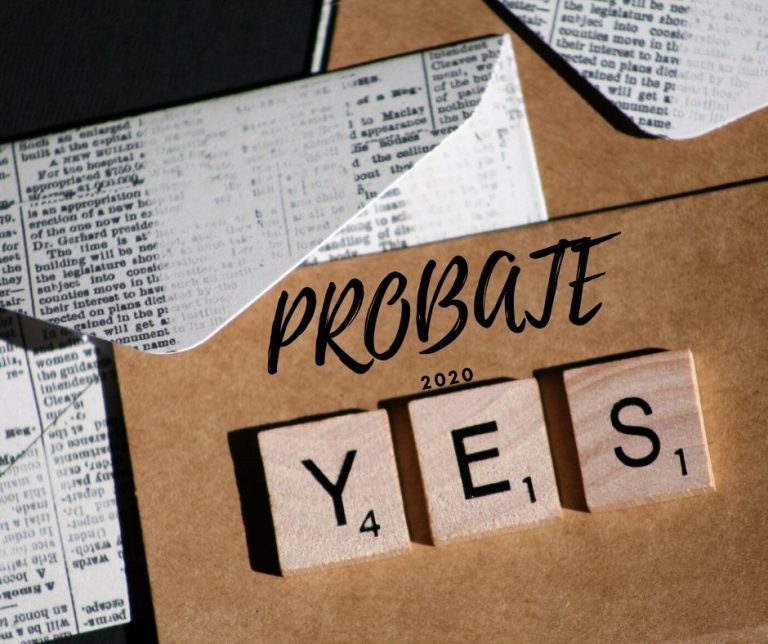How To Avoid The Probate Process
Probate is a legal process through which the court oversees the distribution of the decedent’s assets according to his or her Will, or applicable law when there is no Will. There are ways to avoid the time and expenses associated with a probate proceeding. Here are the most common ways to transfer ownership of an asset outside of the probate process.
Inter Vivos Gift Transfer
An individual can transfer property to others and thereby avoid owning such property at the time of death. A lifetime gift, also known as an inter vivos gift, can be used to prevent specific assets from passing through probate at death.
Right of Survivorship For Real Property Ownership
The California Civil Code allows real property owners to designate who will inherit their property on death through the manner in which title to the asset is taken. Specifically, two individuals can hold title to an asset in “joint tenancy” with right of survivorship. Spouses may also hold property as community property with right of survivorship.
With right of survivorship, the asset is owned entirely by the surviving joint tenant or spouse after the death of the other joint tenant or spouse. The transfer of title is accomplished generally through the recording of a death certificate and affidavit concerning the death with the county recorder’s office where the property is located. With right of survivorship, the decedent’s Will does not control the distribution of the asset and no probate is required.
Living Trust Transfer
Assets held in a properly prepared living trust do not need to go through probate. In California, you can make a living trust to avoid probate for virtually any asset you own – real estate, bank accounts, vehicles, and so on. You can create a trust document, naming yourself as trustee and someone to take over as trustee after your death (called a successor trustee). You must then transfer ownership of your property to yourself as the trustee of the trust. Once that’s done, the property will be controlled by the terms of the trust. At your death, your successor trustee will be able to transfer it to the trust beneficiaries without probate court proceedings.
Bank or Brokerage Account Payable On Death Designation
In California, you can add a “payable-on-death” (POD) designation to bank accounts, including savings accounts, checking accounts and certificates of deposit. You still control all the money in the account while living. At your death, the beneficiary receives the money directly from the bank, without the need for probate court proceedings. The decedent’s share of the funds passes by the terms of the contract (i.e., signature card) and if unspecified by contract, then by operation of law to the surviving individuals. The transfer of title is accomplished by providing a death certificate to the financial institution holding the account. The financial institution in turn generally opens a new account in the name of the surviving individual(s).
In addition, California lets you register stocks and bonds in transfer-on-death (TOD) form. People commonly hold brokerage accounts this way. If you register an account this way, the beneficiary you name will inherit the account automatically at your death. No probate court proceedings will be necessary.
Retention Of Life Estate In Real Property Transfer
A real property asset can avoid probate by way of a transfer of the property with the retention of a life estate by the grantor. For example, the sole owner of a home can transfer ownership of it to someone else and simultaneously retain the right to possession of the home for as long as he or she lives. The person to whom the home is transferred becomes the sole owner of the house upon the transferor’s death, without the need for probate.
Small Estate Affidavit
In California, estates valued at $166,250 or less do not need to be probated. This threshold amount is calculated by totaling all of the probate assets owned by the decedent. Estates valued at less than the threshold amount are administered by preparing an affidavit which is presented to the various institutions (banks, brokerages, etc.) that hold the asset(s). Upon receipt of the affidavit, the financial institution will effectuate the transfer of the property into the name of the rightful beneficiary.
Transfer-On-Death Vehicle Registration
California allows transfer-on-death registration of vehicles. If you register your vehicle this way, the beneficiary you name will automatically inherit the vehicle after your death. No probate court proceeding will be necessary. All you need to do is name a TOD beneficiary on each of your vehicles and complete a new title application for each vehicle, listing the person of your choice as the TOD beneficiary. The Department of Motor Vehicles will then issue a new title showing your TOD beneficiary designation.
Lynx Legal Service can handle the preparation of any of the above-described transfer documents, allowing you to avoid probate for one or more assets of the decedent’s estate. For more information and pricing please contact us at 888-441-2355, or info@lynxlegal.com. Our experienced professionals are standing by to answer any inquiries you may have.
